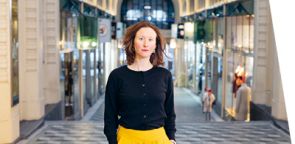
Eco-anxiety experienced by Noémie Cheval, 41, propelled her into action. Now the young woman teaches people about the ecological and inclusive transition at a centre she created in Biel/Bienne.
What scares me most are our behaviours, our lifestyles, our political and economic choices that are causing climate change.
Eco-anxiety stems from the often painful realisation about the crisis we are currently going through. The legitimacy given to those responsible for the large-scale destruction of our living conditions jolted me into a shock that triggered my eco-anxiety.
I’ve been sensitive to social injustice since I was a teenager. As a student, I began to think hard about the need to develop more resilient human systems, especially when I was doing my master’s degree in anthropology and a specialised degree in regions and populations in the context of conflict, but also through experiences and the people I met. In 2011, I discovered the Work That Reconnects practical ecopsychology workshops, created by American author Joanna Macy. And that was where it all really started. That book helped me to comprehend the magnitude of the impacts that our infinite growth systems are having on our environment.
But it took some time before I felt what those realisations were doing to me. The resonance of other people’s emotions within the Transition movement (Transition Network) was liberating. The disappearance of biotopes makes me sad, and the fact that public authorities are doing practically nothing about it makes me angry. I feel anxious about certain concrete situations, such as the climatic asthma I developed a few years ago, caused by changes in air quality. Not buying a fan out of environmental beliefs, putting my family at risk, is not easy to accept. Through the workshops, I also admitted to myself that I was ashamed to be part of the only species responsible for all these problems. Fear of the effects of climate change is a response to a scientifically proven threat. Recognising that and accepting the reality of the situation takes a great deal of courage and maturity.
I’ve experienced intense loneliness. That might be why some people protect themselves by choosing to stay in denial. As for me, I’ve had to give up on a measure of success represented by a stand-alone villa, which is ecologically unjustifiable.
Getting around on a bike with my young children also requires courage alongside SUVs, as public spaces are not always adapted to non-polluting, non-motorised means of transport. But it gives me great joy, because I feel connected to my environment and to the solutions to protect it, which are accessible to everyone.
Given the urgency of the situation, my desire to take action to protect life, i.e. my friends and family, as well as the forests and all the species on earth, often comes up against scientific denial – both political and private –, which can cause a feeling of powerlessness and despair. Getting involved in the Transition movement was therefore a pivotal turn of events, because it helped me to realise that I’m not alone, and that there is a long history of resistance, tools and organisations bringing solutions to effect societal change.
While trying to cope with this paralysing eco-anxiety, I can put my energy and imagination into positive change. Whether as a transition expert with the Transition Network in French-speaking Switzerland or as a mother, I’m taking action alongside thousands of others, no longer out of guilt or moral compulsion to consume less, but out of collective resilience. That’s a very different thing. This inner transition allows me to continue to make a commitment to life in my own small way, with determination and pleasure.”